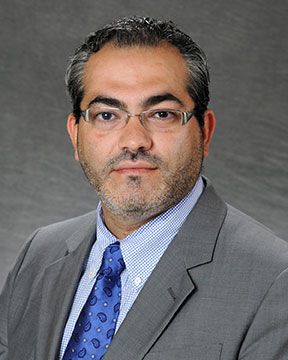
WASHINGTON (June 25, 2014) — A first-of-its-kind clinical trial at the George Washington University (GW) Medical Faculty Associates employs low-frequency deep brain stimulation to potentially help reduce epileptic seizures in patients with mesial temporal lobe epilepsy (MTLE) — the most common type of focal epilepsy that often necessitates surgical resection of the temporal lobe, risking memory function. Mohamad Koubeissi, M.D., director of the Epilepsy Center and associate professor of neurology at the GW School of Medicine and Health Sciences, is leading the clinical trial, which follows research he published in the Annals of Neurology in Aug. 2013. His research found that low-frequency stimulation reduced epileptic seizures in patients by 92 percent without impairing memory.
“This is an innovative clinical trial that aims to identify novel modalities to reduce seizures in individuals with medically-intractable temporal lobe epilepsy, who are at risk of sustaining memory decline with the surgical removal of the temporal lobe,” said Koubeissi. “Over the next few years, we hope that the results will be similar to previous research, leading to better treatment options for these patients.”
In the past, deep brain stimulation in epilepsy has targeted gray matter structures using high frequencies, with limited success. Only the surgical resection of the temporal lobe was seen as an effective treatment option for those suffering from MTLE – a surgery that asks patients to weigh major risks such as potential memory impairment. Furthermore, many MTLE patients are not eligible for surgical resection.
Koubeissi’s research tested low-frequency stimulation of a white matter tract, including the fornix, successfully activating the hippocampus and other areas of the declarative memory circuit. The results suggested that low-frequency stimulation is tolerable and significantly reduces seizures in patients with MTLE. In the next phase of this research, the clinical trial, Koubeissi hopes to attain similar results.


